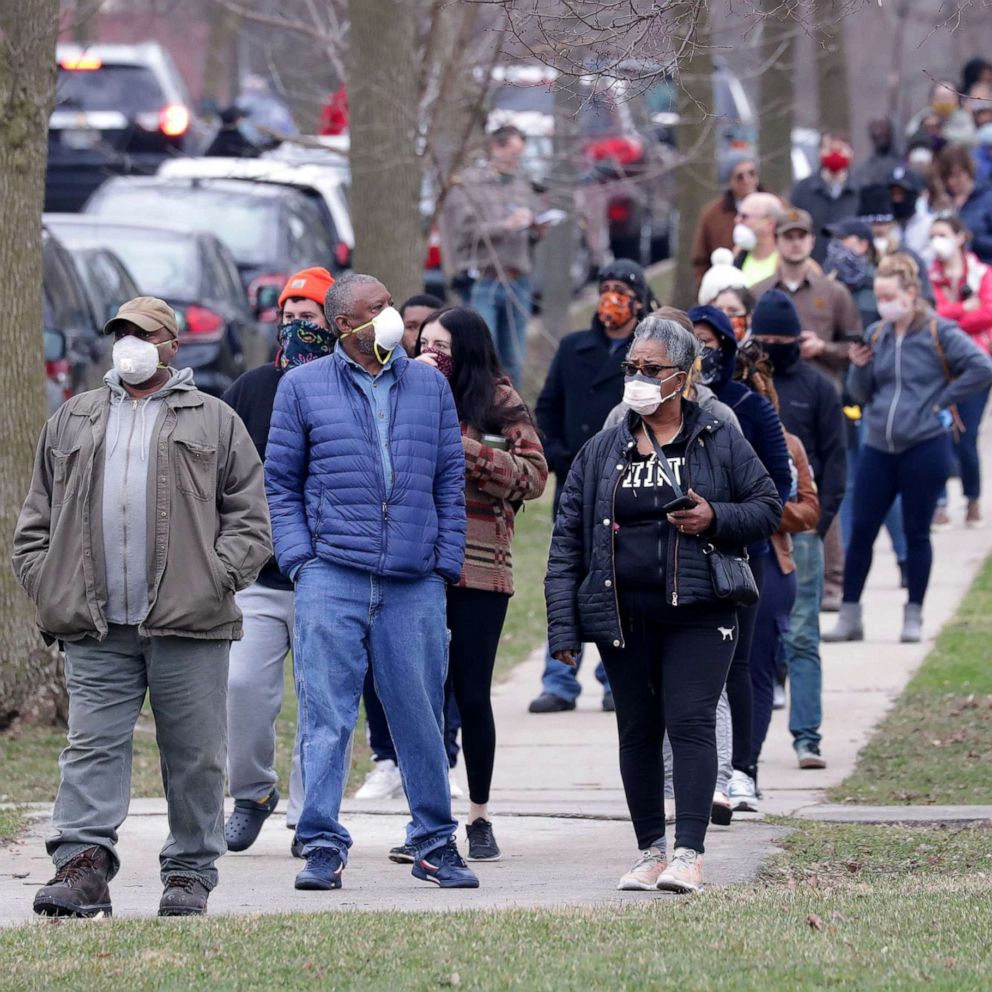Grocery stores see food supplies stabilizing, but don't expect hand sanitizer anytime soon
It will be up to consumers to keep supply for some hot-button items in check.
America’s food supply is stabilizing, but it will be up to consumers to keep the supply for some hot-button items in check, Kroger CEO Rodney McMullen said in an exclusive with "Good Morning America."
“I was in the store last night — we had toilet paper, plenty of meat variety products: beef, pork, chicken, all those things,” McMullen, CEO of America’s second-largest general retailer, said. “As for hand sanitizer, I think it is going to take a little bit longer.”
Along with Kroger, ABC News reached out to representatives at Walmart, Wegmans, Albertsons and Publix to discuss growing concerns over the country’s food supply, recent consumer behavior, and the future of grocery store shopping amid the COVID-19 pandemic.
Is the food supply chain running dry?
None of the grocery stores ABC News spoke with indicated that the nation’s food supply would run dry. Leslie Sarasin, president and CEO of The Food Industry Association, reaffirmed this in a statement Tuesday.
Tune into ABC at 1 p.m. ET and ABC News Live at 4 p.m. ET every weekday for special coverage of the novel coronavirus with the full ABC News team, including the latest news, context and analysis.
“We can all rest assured that there is enough retail supply of food products,” she said. “What shoppers may be experiencing is sporadic unavailability of certain ‘high-demand items.’”
While this spike in demand might have initially left some shelves barren, a spokesperson for Wegmans said the food supply is beginning to once again meet demand.
“While the unexpected increase in demand has challenged the supply chain, we’re seeing it start to equal out,” said Laura Camera, a Wegmans spokesperson. “We are confident it will stabilize as long as we prioritize our needs.”
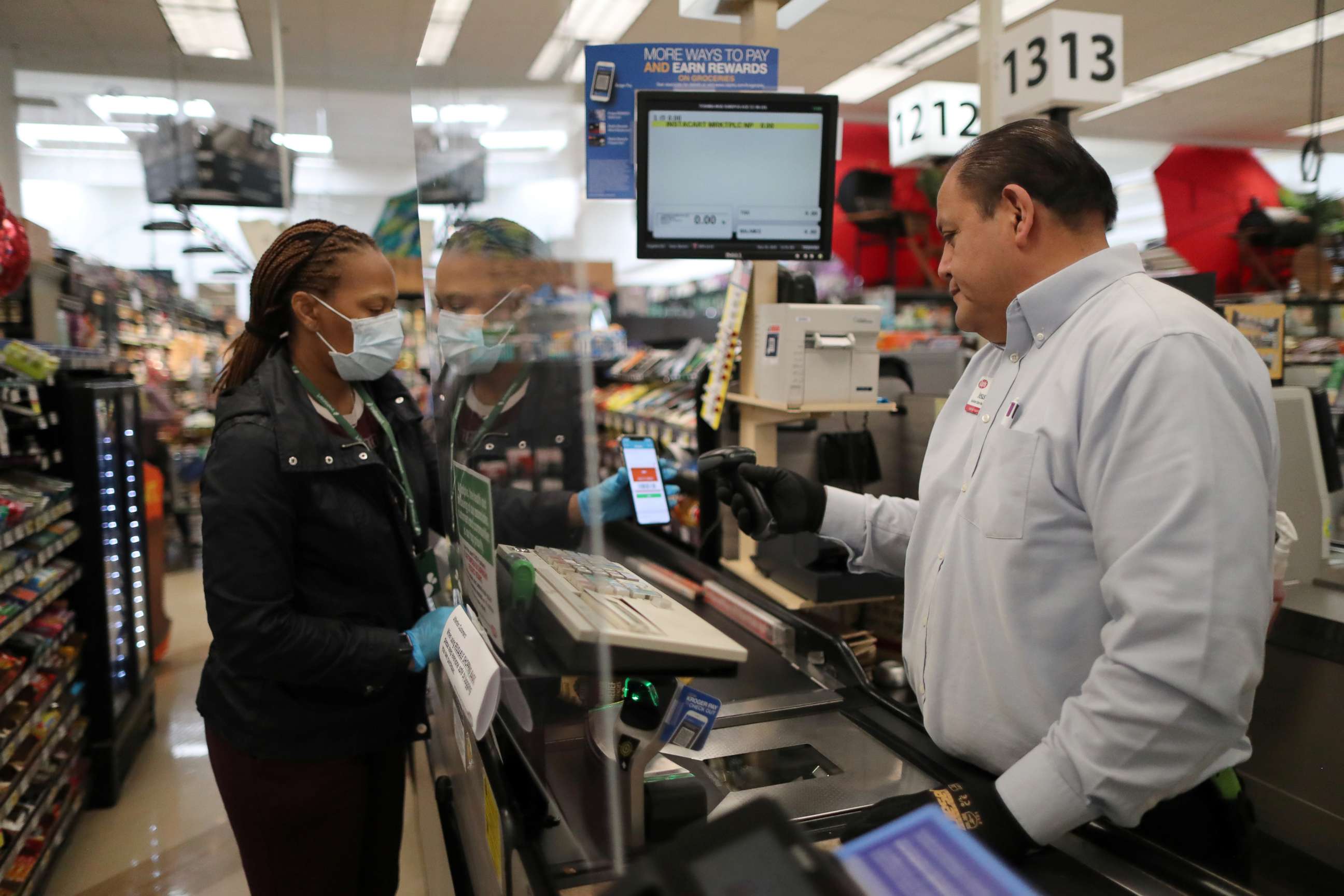
Consumers should expect some preferred brands will continue to lag due to high demand, but there will continue to be other options. Competition amongst store brand foods may actually stave off future supply issues, according to experts.
“Competition caused variety to be available, people have a lot of choices,” Ananth Iyer, senior associate dean of the Krannert School of Management at Purdue University. “I don’t see a shortage of food at grocery stores because of the variety available.”
According to Wegmans, Iyer’s theory may hold true.
“Although we may not have every variety available, we are working hard to give our customers options in each category,” Camera told ABC News.
In addition, food produced with more automation than manual labor could support the food supply chain for the foreseeable future, according to Iyer.
Iyer says foods like pasta, canned goods and cereal likely won’t have issues meeting high demand because of their manufacturing process.
“Robots don’t get viruses,” said Iyer.
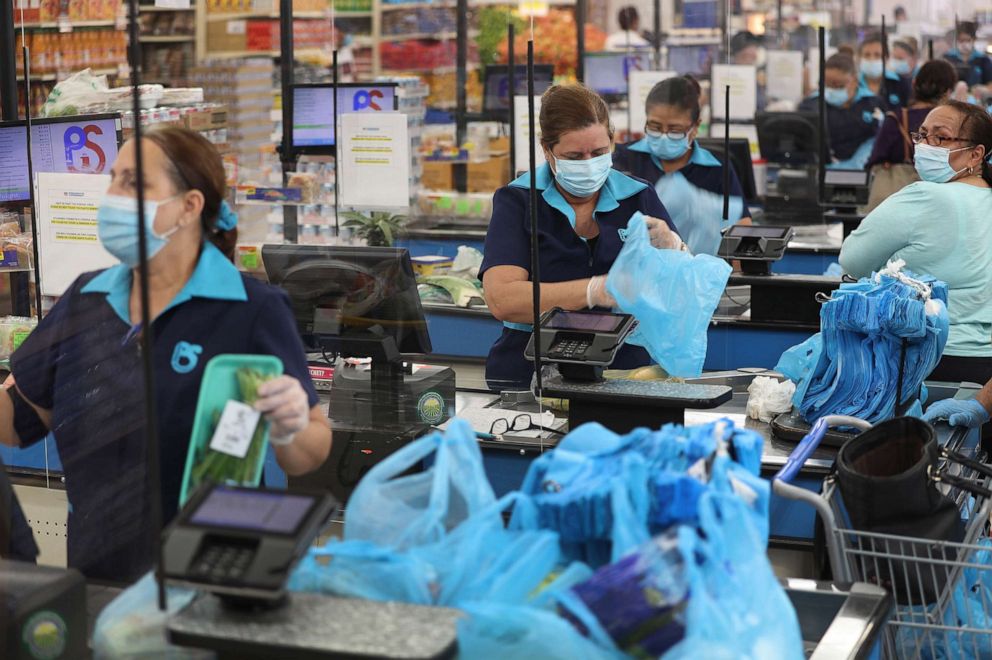
What are consumers buying?
“We’re seeing customers come in less often and buying more during each trip,” said the Wegman’s spokesperson. McMullen said Kroger is noting the same trend with its customers.
Consumers are looking for items with a lasting shelf life, according to a Walmart spokesperson. Along with purchasing frozen and canned goods, Walmart says consumers are trying to preserve foods themselves.
“Consumers are looking to extend the shelf life of [their] food,” said the spokesperson. “Freezers, plastic storage, vacuum seal and canning accessory [sales] are dramatically up.”
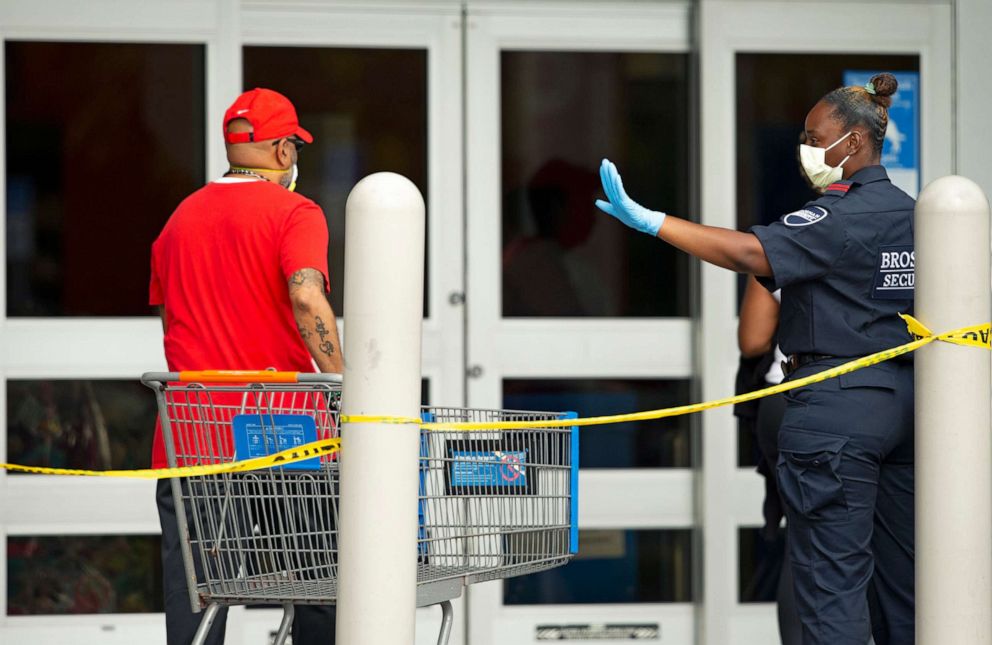
While grocers and experts claim the food supply is stabilizing, the demand for sanitizer products continues to overwhelm the market.
Rationing for items like hand sanitizer will likely continue.
All of the grocery stores ABC News spoke with named sanitizers as the products with demand that continues to outstrip supply. Wegmans, along with several other retailers, have implemented purchase limits.
“We are seeing better conditions in many categories; however, toilet paper, hand sanitizer and paper products have been slower to rebound,” said Maria Brous, spokesperson for Publix, a supermarket chain headquartered in Florida. “For this very reason, customers will still see limits in place across our stores.”
Big-box retailers like Walmart are also struggling to restock the shelves.
“We are continually replenishing the supply of high demand items such as disinfectant wipes and hand sanitizer; however, demand continues to be high,” a Walmart spokesperson said.
“Toilet paper — I think within a week or so you'll be able to find it anywhere,” said McMullen, adding that he’s seen Kroger stores maintain a healthy toilet paper inventory over the past several days. “On hand sanitizer, I think it's going to take a little bit longer.”
Other grocers agreed, pointing to issues with the sanitizer supply chain.
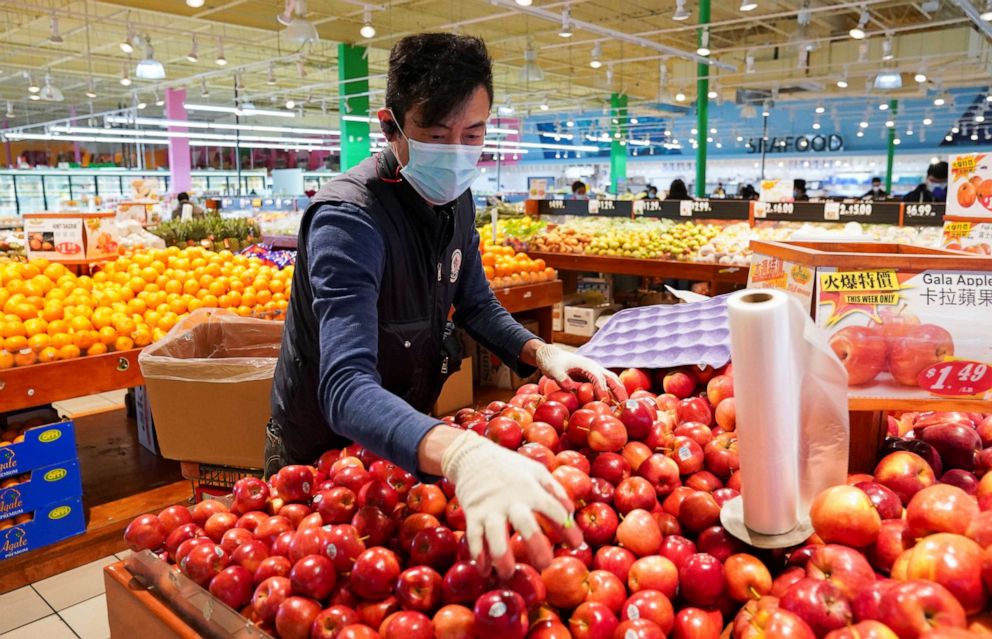
“As products run low, we are replenishing them just as soon as the supply chain allows,” added Andrew Whelan, spokesperson for Albertsons, a conglomerate that operates well-known banners like Safeway and Vons.
Lysol and Clorox did not respond to questions concerning their production. For now, none of the grocery stores that spoke with ABC News indicated when sanitizer products might be back on shelves.
Grocery shopping looks different, and that likely won’t change anytime soon.
As Americans across the country have already noticed, grocery stores have implemented changes to the shopping experience. Almost all stores say they are “following CDC protocols,” and if they want to stay in business, they will likely have to continue to do so.
“Stores will compete on hygiene and cleanliness,” said Iyer. “I don’t think this will last forever, but companies will depend on winning back customer trust.”
Walmart, Wegmans, Albertsons and others have added plexiglass barriers — or “sneeze guards” — to their checkout lanes. Most of their stores now have markers on the floor to indicate where customers should stand to adhere to social distancing. In addition, Albertsons has implemented one-way foot traffic through stores, including up and down aisles.
Albertsons, Walmart, Publix, Kroger and Wegmans say they will continue to minimize the number of customers allowed in stores at a time. Wegmans says it will continue to operate its stores at 15-20% of their maximum occupancy.
Albertsons says it will have signs outside of its stores requesting that customers with symptoms or who’ve been exposed to someone with symptoms not enter the store.
Kroger is testing a “pickup only” means of operation.
“We are testing one store where we converted exclusively to pick up and delivery,” McMullen said on GMA. “If you look overall, across the whole country, our pick up and delivery business is up triple digits.”
Concerns for worker safety continue.
In the wake of dozens of grocery workers dying from COVID-19 across the country, concerns for worker safety have grown. As grocery stores plan to keep running, new safety guidelines need to be implemented.
Walmart and Wegmans have recently begun pre-shift health screening and temperature checks for their employees.
What to know about coronavirus:
- How it started and how to protect yourself: Coronavirus explained
- What to do if you have symptoms: Coronavirus symptoms
- Tracking the spread in the U.S. and worldwide: Coronavirus map
“Anyone exhibiting symptoms, or with a temperature of 100 degrees or higher, will be asked to go home -- with pay -- and contact their medical provider,” said the Wegman’s spokesperson.
If a Wegmans employee tests positive for COVID-19, they are immediately sent home.
“A triage team of experts has an immediate, in-depth conversation with the employee to offer support, determine when symptoms started and with whom they had close contact,” Camera said. “If needed, we’ll also review schedules, time punches, and in-store video footage.”
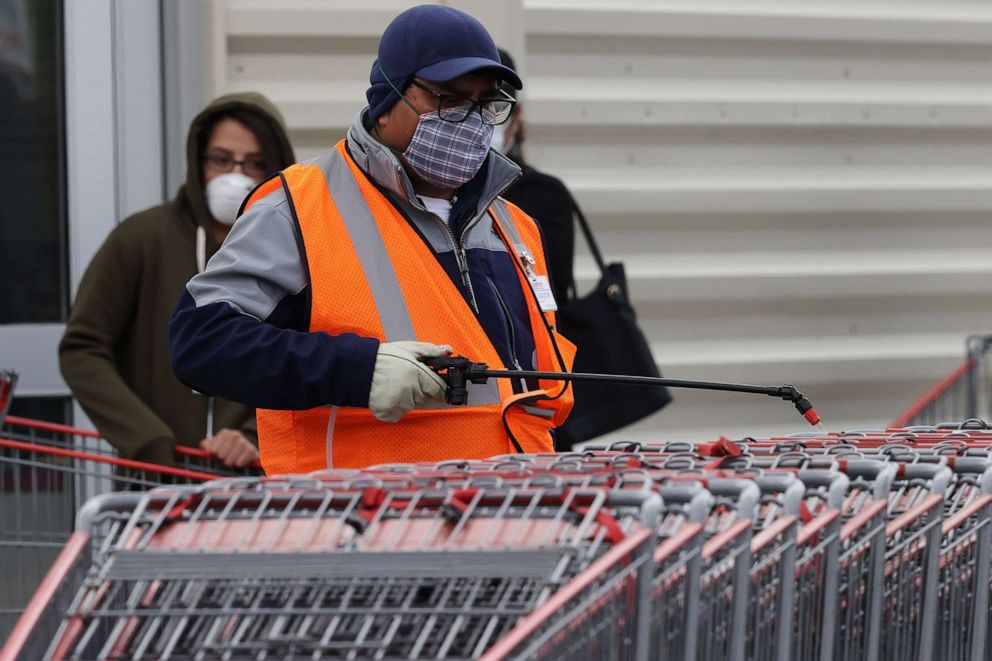
Unions, including one that represents Kroger, are calling on federal and state government officials to designate grocery store associates as "extended first responders" or "emergency personnel."
"Given the significant daily risk these workers face, we are calling on all of our federal and state leaders to take immediate action," McMullen said in a statement last week. "This urgent call for temporary first responder or emergency personnel status is not just about protecting grocery store workers; it is also about protecting the customers they serve and our nation’s food supply in general."
McMullen says granting grocery store workers “first responder” designation would ensure they have priority access to personal protection equipment like masks and gloves.
McMullen announced on GMA that later this week, all Kroger store associates would be mandated to wear a mask.
This report was featured in the Thursday, April 23, 2020, episode of “Start Here,” ABC News’ daily news podcast.
"Start Here" offers a straightforward look at the day's top stories in 20 minutes. Listen for free every weekday on Apple Podcasts, Google Podcasts, Spotify, the ABC News app or wherever you get your podcasts.
